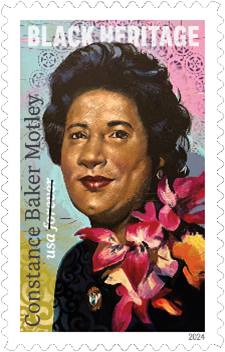
The U.S. Postal Service celebrated the remarkable contributions of Judge Constance Baker Motley (1921–2005), a civil rights pioneer and judiciary trailblazer, as the 47th honoree in the Black Heritage stamp series.
A dedication ceremony for the stamp was held at the Constance Baker Motley Recreation Center in New York.
News about the stamps is being shared with the hashtags #ConstanceBakerMotley and #BlackHeritageStamps. A video will be posted two hours after the ceremony providing more information and insights into the stamp on the Postal Service’s Facebook and Twitter pages at facebook.com/USPS and twitter.com/usps.
“Judge Motley was a brilliant legal strategist who conquered adversities, helped dismantle legal segregation, and served as a role model and mentor for those who followed in her footsteps,” said Anton G. Hajjar, a member of the USPS Board of Governors. “Her tireless work and unwavering dedication impacted nearly every touchpoint of the 20th-century civil rights movement. The United States Postal Service is privileged to honor Judge Motley on the 47th Black Heritage Series stamp.”
Joining Hajjar for the ceremony were master of ceremonies Gloria Browne-Marshall, professor of constitutional law at the City University of New York’s John Jay College of Criminal Justice (CUNY); Sue Donoghue, commissioner of the New York City Department of Parks and Recreation; Constance Royster, niece of Constance Baker Motley; Charly Palmer, stamp artist; Sherrilyn Ifill, the Vernon Jordan distinguished professor of civil rights and former president and direct counsel of the National Association for the Advancement of Colored People (NAACP) Legal Defense Fund; William Kuntz II, U.S. District Court Judge for the Eastern District of New York; and Gillian Lester, dean and Lucy G. Moses professor of law at Columbia Law School.
“It never felt like hers was a household name among the giants of the civil rights movement, or easily associated with landmark cases or clients, when in fact she was,” said Royster. “Behind familiar names like James Meredith, Charlayne Hunter Gault, Judy Heumann, Melissa Ludke and many others was a great servant of the law Constance Baker Motley.”
Also, participating in the stamp dedication ceremony were vocalists Craigg Stagg and Anahera Smith-McDaniel.
The stamp features a portrait of Motley by artist Charly Palmer, based on an Associated Press photograph. Rendered in acrylic on canvas work, the portrait displays elements of Palmer’s signature style: Stenciled circular shapes around the head that suggest royalty, and the heavy brushstrokes and scratches that provide added textures. Stenciled curlicues embellish the lower background and blend into Motley’s black dress. Her colorful corsage and a brooch further enliven the image.
The Constance Baker Motley stamp is a Forever stamp issued in panes of 20. Forever stamps are always equal in value to the current First-Class Mail 1 ounce price.
Background
Constance Baker Motley was the first African American woman to argue a case before the U.S. Supreme Court and the first to serve as a federal judge. A master legal tactician, Motley played a key role in knocking down legal segregation.
She started her career in 1945 when she began working for the future U.S. Supreme Court Justice Thurgood Marshall at the National Association for the Advancement of Colored People (NAACP) Legal Defense and Education Fund (LDF). She would stay 20 years, rising to associate counsel, second from the top.
While at the LDF she sued the University of Mississippi on behalf of James Meredith, who had been refused entrance, and the state of Mississippi on behalf of “Freedom Riders,” who had been jailed while testing the interstate transportation laws. She also represented Dr. Martin Luther King, Jr., after he was arrested for marching in Birmingham, Alabama, in spring 1963. Motley worked on about 60 cases that reached the Supreme Court. She won nine of the 10 cases she argued before the Court.
Motley and her colleagues often faced danger and disrespect as they challenged the entrenched racist system of the South. She also experienced sexism at a time when lawyers were a rarity.
In 1966, Motley was nominated by President Lyndon B. Johnson to a seat on the U.S. District Court for the Southern District of New York — the largest and busiest federal trial court in the country. Despite her nominations being held up for seven months by Sen. James Eastland, a strident segregationist from Mississippi, Motley was sworn in on Sept. 9, 1966 — the first African American woman on the federal bench. She rose to chief judge in 1982 and senior judge in 1986.
Motley was awarded the Presidential Citizens Medal in 2001 by President Bill Clinton. She died on Sept. 28, 2005.
USPS


Bulloch Public Safety
06/12/2025 Booking Report for Bulloch County

Chattooga Schools
Small Towns Grow Big Ideas: A Scientist’s Journey from Chattooga to Duke

Chattooga Local News
Mr. Christopher “DJ” Chapman Obituary

Bulloch Public Safety
05/27/2025 Booking Report for Bulloch County

Bulloch Public Safety
06/09/2025 Booking Report for Bulloch County

Bulloch Public Safety
06/02/2025 Booking Report for Bulloch County

Bulloch Public Safety
05/19/2025 Booking Report for Bulloch County

Bulloch Public Safety
05/16/2025 Booking Report for Bulloch County







